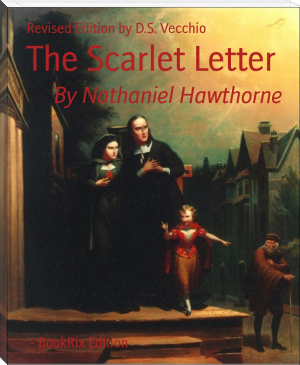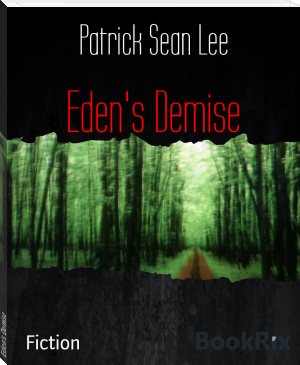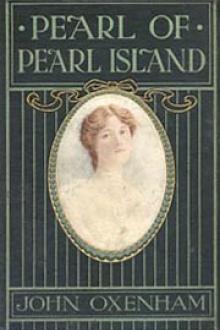The Scarlet Letter, Revised Edition by D.S. Vecchio [simple e reader txt] 📗

- Author: Revised Edition by D.S. Vecchio
Book online «The Scarlet Letter, Revised Edition by D.S. Vecchio [simple e reader txt] 📗». Author Revised Edition by D.S. Vecchio
"Hast thou not tortured him enough?" said Hester, noticing the old man's look. "Has he not paid thee all?"
"No, no! He has but increased the debt!" answered the physician, and as he proceeded, his manner lost its fiercer characteristics, and subsided into gloom. "Dost thou remember me, Hester, as I was nine years agone? Even then I was in the autumn of my days, nor was it the early autumn. But all my life had been made up of earnest, studious, thoughtful, quiet years, bestowed faithfully for the increase of mine own knowledge, and faithfully, too, though this latter object was but casual to the other--faithfully for the advancement of human welfare. No life had been more peaceful and innocent than mine; few lives so rich with benefits conferred. Dost thou remember me? Was I not, though you might deem me cold, nevertheless a man thoughtful for others, craving little for himself--kind, true, just and of constant, if not warm affections? Was I not all this?"
"All this, and more," said Hester.
"And what am I now?" demanded he, looking into her face, and permitting the whole evil within him to be written on his features. "I have already told thee what I am--a fiend! Who made me so?"
"It was myself," cried Hester, shuddering. "It was I, not less than he. Why hast thou not avenged thyself on me?"
"I have left thee to the scarlet letter," replied Roger Chillingworth. "If that has not avenged me, I can do no more!"
He laid his finger on it with a smile.
"It has avenged thee," answered Hester Prynne.
"I judged no less," said the physician. "And now what wouldst thou with me touching this man?"
"I must reveal the secret," answered Hester, firmly. "He must discern thee in thy true character. What may be the result I know not. But this long debt of confidence, due from me to him, whose bane and ruin I have been, shall at length be paid. So far as concerns the overthrow or preservation of his fair fame and his earthly state, and perchance his life, he is in my hands. Nor do I--whom the scarlet letter has disciplined to truth, though it be the truth of red-hot iron entering into the soul--nor do I perceive such advantage in his living any longer a life of ghastly emptiness, that I shall stoop to implore thy mercy. Do with him as thou wilt! There is no good for him, no good for me, no good for thee. There is no good for little Pearl. There is no path to guide us out of this dismal maze."
"Woman, I could well-nigh pity thee," said Roger Chillingworth, unable to restrain a thrill of admiration too, for there was a quality almost majestic in the despair which she expressed. "Thou hadst great elements. Peradventure, hadst thou met earlier with a better love than mine, this evil had not been. I pity thee, for the good that has been wasted in thy nature."
"And I thee," answered Hester Prynne, "for the hatred that has transformed a wise and just man to a fiend! Wilt thou yet purge it out of thee, and be once more human? If not for his sake, then doubly for thine own! Forgive, and leave his further retribution to the Power that claims it! I said, but now, that there could be no good event for him, or thee, or me, who are here wandering together in this gloomy maze of evil, and stumbling at every step over the guilt wherewith we have strewn our path. It is not so! There might be good for thee, and thee alone, since thou hast been deeply wronged and hast it at thy will to pardon. Wilt thou give up that only privilege? Wilt thou reject that priceless benefit?"
"Peace, Hester--peace!" replied the old man, with gloomy sternness--"it is not granted me to pardon. I have no such power as thou tellest me of. My old faith, long forgotten, comes back to me, and explains all that we do, and all we suffer. By thy first step awry, thou didst plant the germ of evil; but since that moment it has all been a dark necessity. Ye that have wronged me are not sinful, save in a kind of typical illusion; neither am I fiend-like, who have snatched a fiend's office from his hands. It is our fate. Let the black flower blossom as it may! Now, go thy ways, and deal as thou wilt with yonder man."
He waved his hand, and betook himself again to his employment of
gathering herbs.
XV. HESTER AND PEARL
So Roger Chillingworth--a deformed old figure with a face that haunted men's memories longer than they liked--took leave of Hester Prynne, and went stooping away along the earth. He gathered here and there a herb, or grubbed up a root and put it into the basket on his arm. His gray beard almost touched the ground as he crept onward. Hester gazed after him a little while, looking with a half fantastic curiosity to see whether the tender grass of early spring would not be blighted beneath him and show the wavering track of his footsteps, sere and brown, across its cheerful verdure. She wondered what sort of herbs they were which the old man was so sedulous to gather. Would not the earth, quickened to an evil purpose by the sympathy of his eye, greet him with poisonous shrubs of species hitherto unknown, that would start up under his fingers? Or might it suffice him that every wholesome growth should be converted into something deleterious and malignant at his touch? Did the sun, which shone so brightly everywhere else, really fall upon him? Or was there, as it rather seemed, a circle of ominous shadow moving along with his deformity whichever way he turned himself? And whither was he now going? Would he not suddenly sink into the earth, leaving a barren and blasted spot, where, in due course of time, would be seen deadly nightshade, dogwood, henbane, and whatever else of vegetable wickedness the climate could produce, all flourishing with hideous luxuriance? Or would he spread bat's wings and flee away, looking so much the uglier the higher he rose towards heaven?
"Be it sin or no," said Hester Prynne, bitterly, as still she gazed after him, "I hate the man!"
She upbraided herself for the sentiment, but could not overcome or lessen it. Attempting to do so, she thought of those long-past days in a distant land, when he used to emerge at eventide from the seclusion of his study and sit down in the firelight of their home, and in the light of her nuptial smile. He needed to bask himself in that smile, he said, in order that the chill of so many lonely hours among his books might be taken off the scholar's heart. Such scenes had once appeared not otherwise than happy, but now, as viewed through the dismal medium of her subsequent life, they classed themselves among her ugliest remembrances. She marveled how such scenes could have been! She marveled how she could ever have been wrought upon to marry him! She deemed it her crime most to be repented of, that she had ever endured and reciprocated the lukewarm grasp of his hand, and had suffered the smile of her lips and eyes to mingle and melt into his own. And it seemed a fouler offence committed by Roger Chillingworth than any which had since been done him, that, in the time when her heart knew no better, he had persuaded her to fancy herself happy by his side.
"Yes, I hate him!" repeated Hester more bitterly than before. "He betrayed me! He has done me worse wrong than I did him!"
Let men tremble to win the hand of woman, unless they win along with it the utmost passion of her heart! Else it may be their miserable fortune, as it was Roger Chillingworth's, when some mightier touch than their own may have awakened all her sensibilities, to be reproached even for the calm content, the marble image of happiness, which they will have imposed upon her as the warm reality. But Hester ought long ago to have done with this injustice. What did it betoken? Had seven long years, under the torture of the scarlet letter, inflicted so much of misery and wrought out no repentance?
The emotion of that brief space, while she stood gazing after the crooked figure of old Roger Chillingworth, threw a dark light on Hester's state of mind, revealing much that she might not otherwise have acknowledged to herself.
He being gone, she summoned back her child.
"Pearl! Little Pearl! Where are you?"
Pearl, whose activity of spirit never flagged, had been at no loss for amusement while her mother talked with the old gatherer of herbs. At first, as already told, she had flirted fancifully with her own image in a pool of water, beckoning the phantom forth, and--as it declined to venture--seeking a passage for herself into its sphere of impalpable earth and unattainable sky. Soon finding, however, that either she or the image was unreal, she turned elsewhere for better pastime. She made little boats out of birch-bark, and freighted them with snail shells, and sent out more ventures on the mighty deep than any merchant in New England; but the larger part of them foundered near the shore. She seized a live horse-shoe by the tail, and made prize of several five-fingers, and laid out a jelly-fish to melt in the warm sun. Then she took up the white foam that streaked the line of the advancing tide, and threw it upon the breeze, scampering after it with winged footsteps to catch the great snowflakes ere they fell. Perceiving a flock of beach birds that fed and fluttered along the shore, the naughty child picked up her apron full of pebbles, and, creeping from rock to rock after these small sea-fowl, displayed remarkable dexterity in pelting them. One little gray bird, with a white breast, Pearl was almost sure had been hit by a pebble, and fluttered away with a broken wing. But then the elf-child sighed, and gave up her sport, because it grieved her to have done harm to a little being that was as wild as the sea- breeze, or as wild as Pearl herself.
Her final employment was to gather seaweed of various kinds, and make herself a scarf or mantle, and a head-dress, and thus assume the aspect of a little mermaid. She inherited her mother's gift for devising drapery and costume. As the last touch to her mermaid's garb, Pearl took some eel-grass and imitated, as best she could, on her own bosom the decoration with which she was so familiar on her mother's. A letter—the letter A--but freshly green instead of scarlet.





Comments (0)